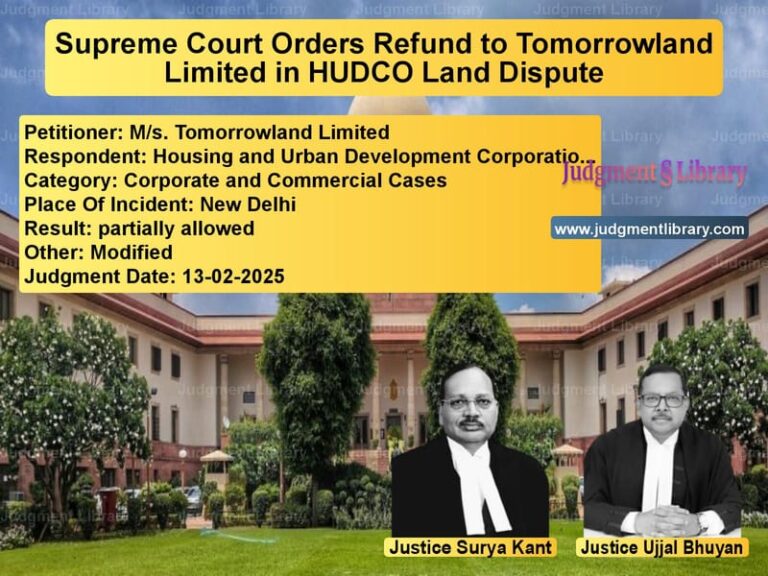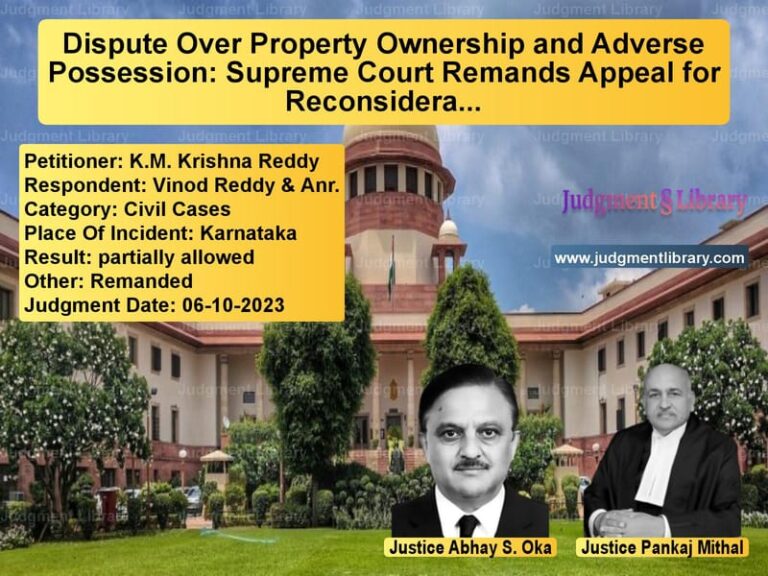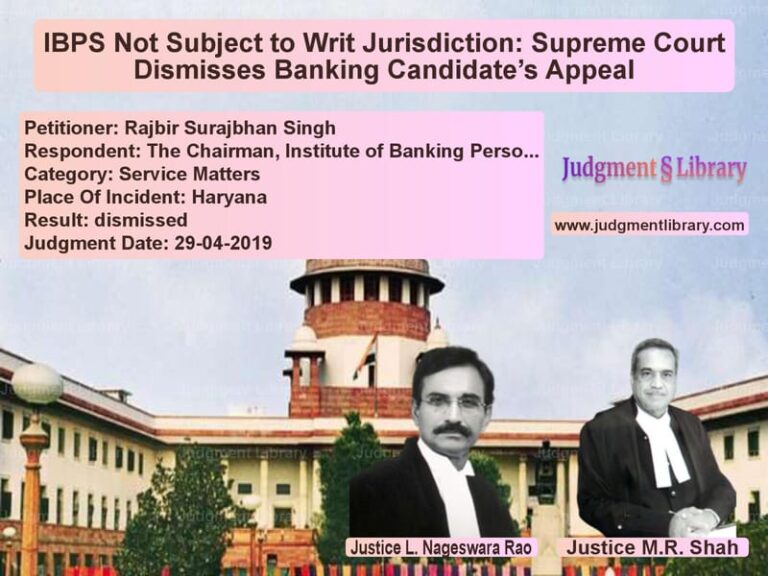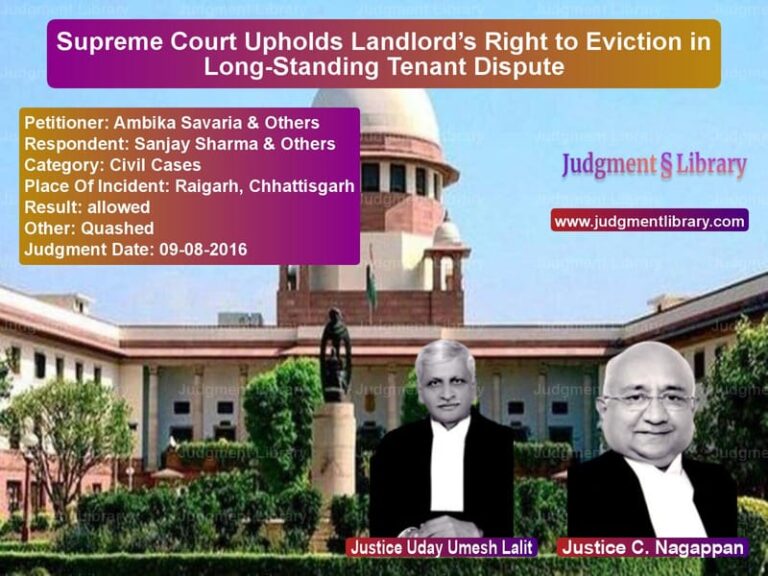Supreme Court Restores Workmen’s Compensation Award: Limits High Court’s Power
The case of Golla Rajanna & Others vs. The Divisional Manager & Another is a crucial Supreme Court ruling delivered on November 23, 2016. This judgment pertains to compensation awarded under the Workmen’s Compensation Act, 1923, and examines the limited jurisdiction of High Courts in interfering with factual findings of the Workmen’s Compensation Commissioner.
Background of the Case
The appellants, who were workmen, sustained injuries while employed in a lorry-related accident. They filed claims before the Labour Officer-cum-Workmen’s Compensation Commissioner, Division No. II, Bellary, who awarded compensation based on the percentage of disability suffered by each claimant. The injuries and resulting disablements ranged from 35% to 40% for different claimants, and compensation was granted accordingly.
However, the Insurance Company challenged the award in the Karnataka High Court under Section 30(1) of the Workmen’s Compensation Act, 1923. The High Court significantly reduced the compensation by lowering the assessed percentage of disability to 5%, citing lack of sufficient medical evidence. This decision led to an appeal before the Supreme Court.
Key Legal Issues Considered
- Did the High Court exceed its jurisdiction under Section 30 of the Workmen’s Compensation Act?
- Was the Workmen’s Compensation Commissioner’s decision based on sufficient medical evidence?
- Could the High Court re-assess the percentage of disability in an appeal restricted to substantial questions of law?
Arguments Presented
Appellants’ (Golla Rajanna & Others) Arguments:
- The Workmen’s Compensation Commissioner is the final fact-finding authority under the Act.
- The Commissioner’s decision was based on medical evidence and was not perverse or arbitrary.
- The High Court had no jurisdiction to interfere with factual findings and substitute its own view on the percentage of disability.
Respondents’ (Insurance Company) Arguments:
- The injuries and disabilities claimed by the workmen were not adequately proven before the Commissioner.
- The High Court was correct in re-assessing the percentage of disability since the claimants failed to establish the severity of injuries.
- The Workmen’s Compensation Commissioner erred in awarding excessive compensation without corroborative medical records.
Supreme Court’s Observations
The Supreme Court examined Section 30 of the Workmen’s Compensation Act, 1923, which limits appeals to cases involving a substantial question of law. The Court observed:
“The Workmen’s Compensation Commissioner is the last authority on facts. Parliament has thought it fit to restrict the scope of appeal only to substantial questions of law, being a welfare legislation.”
The Court further noted:
- The Commissioner’s decision was based on a qualified medical practitioner’s assessment.
- The High Court improperly substituted its own views for that of the Commissioner.
- The High Court had no authority to interfere in a factual determination unless it was perverse or based on no evidence.
- The injuries and disabilities suffered by the claimants were well-documented, and there was no reason for the High Court to discredit the findings of the Commissioner.
The Court emphasized:
“The High Court has missed the crucial question of limited jurisdiction and has ventured to re-appreciate the evidence and recorded its own findings on percentage of disability for which also there is no basis.”
Final Judgment
The Supreme Court ruled:
- The High Court’s judgment was set aside.
- The original compensation awarded by the Workmen’s Compensation Commissioner was restored.
- The appeal was allowed, reinstating the full compensation for the workmen.
- There were no costs imposed on either party.
Impact of the Judgment
The ruling has significant implications:
- It affirms that High Courts cannot interfere in factual findings made by the Workmen’s Compensation Commissioner.
- It upholds the principle that compensation must be determined based on medical evidence presented before the Commissioner.
- It strengthens the rights of workmen by preventing arbitrary reductions in compensation at the appellate level.
- It reinforces the welfare-oriented nature of the Workmen’s Compensation Act, ensuring that judicial review remains limited to substantial legal issues.
Conclusion
The Supreme Court’s decision in Golla Rajanna & Others vs. The Divisional Manager & Another is a landmark ruling that protects the rights of injured workmen. By restoring the compensation awarded by the Workmen’s Compensation Commissioner and restricting the High Court’s ability to re-evaluate factual findings, the judgment ensures that labor welfare laws serve their intended purpose. This ruling serves as a crucial precedent in cases involving appeals under the Workmen’s Compensation Act.
Don’t miss out on the full details! Download the complete judgment in PDF format below and gain valuable insights instantly!
Download Judgment: Golla Rajanna & Othe vs The Divisional Manag Supreme Court of India Judgment Dated 23-11-2016.pdf
Direct Downlaod Judgment: Direct downlaod this Judgment
See all petitions in Employment Disputes
See all petitions in Public Sector Employees
See all petitions in Pension and Gratuity
See all petitions in Judgment by Kurian Joseph
See all petitions in Judgment by Rohinton Fali Nariman
See all petitions in allowed
See all petitions in Quashed
See all petitions in supreme court of India judgments November 2016
See all petitions in 2016 judgments
See all posts in Service Matters Category
See all allowed petitions in Service Matters Category
See all Dismissed petitions in Service Matters Category
See all partially allowed petitions in Service Matters Category







